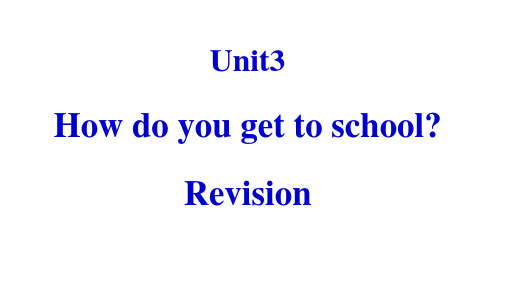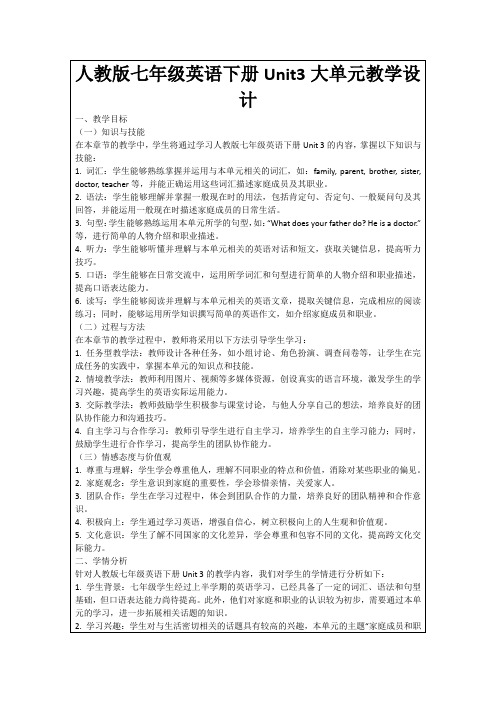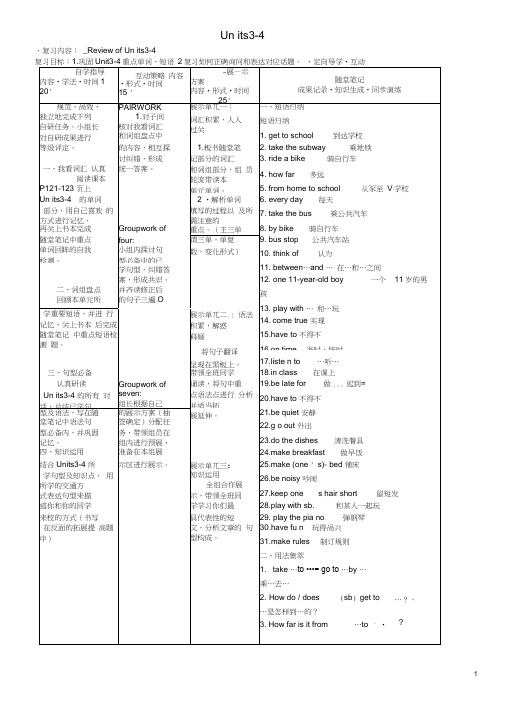【教育资料】人教版七年级下英语Unit3Unit4复习教案学习专用
Unit3+-Unit4+复习课件 人教版七年级英语下册

1.-How do you usually go to school?
-By ___C__bike, but sometimes I take ______bus.
A.a; / B. a; the C. /; the D. /; /
归纳2:提问时间
H__o_w__l_o_n_g_ + does it take sb. to do sth.?句型 How long does it take you to go to school?
Unit3
How do you get to school? Revision
revision
--How do you get to school? --I ride my bike.
ห้องสมุดไป่ตู้
Way
--How long does it take to get to school? --It takes about 20 minutes.
1.It takes Rose about twenty minutes ___C____ to school by bus. A.get B. gets C. to get D. getting 2.It takes ___B__ 25 minutes ________his homework. A. him; to doing B. him; to do C. his; to do D. his; doing
walk to … to
1.到达学校/ 到家 2.在...和...之间 3.他们的梦想成为现实 4.害怕(做)某事 5.某人花费时间做某事 6.步行去…… 7.一个11岁的男孩 8.认为,想起 9.乘铁索过河 10.他对我来说像一位父亲一样 11.骑自行车到学校 12.离学校大约十公里远 13.你觉得怎么样 ? 14.到达学校很容易 15.步行/骑行15分钟的路程
【教育资料】人教版七年级下英语Unit3Unit4复习教案学习专用

Unit 3 How do you get to school?◆短语归纳1.到达学校2.乘地铁3. 骑自行车4. 多远5. 从家到学校6. 每天7. 乘公共汽车8. 骑自行车9. 公共汽车站10. 认为11. 在…和…之间12. 一个11岁的男孩13. 和…玩14. 实现15. 不得不◆用法集萃1. take… to …= go to … by… 乘…去…2. How do / does (sb)get to …? …是怎样到…的?3. How far is it from … to …? 从…到…有多远?【重点句式3】How 引导的特殊疑问句①How是疑问副词,意思是“如何,怎样,用什么手段”,搭配其他的词语形成新的疑问副词,如How old, how much, how many , how long , how far②How long 提问时间有多长How long does it take you to get to work? About 15 minutes.③How far 提问距离有多远How far is it from your home to school? About 2 kilometers.④How much 单独用的时候表示的是“多少钱”;How much 后面加上名词的时候,表示“….有多少”,但要注意后面加的名词是不可数名词。
How much is this pen? 这支笔多少钱?How much water is there in this bottle?有多少水在瓶子里?⑤How many 表示的是“多少”,后面加的一般都是可数名词。
句子结构是:How many +名词复数+are there +地点、时间状语How many apples are there in the basket?单选1. How are you going to the museum, _ bus or __ ___ foot?A. on; onB. by; onC. on; byD. by; by2. It __ ___me five hours to draw this picture.A. makesB. getsC. spendsD. takes3. Ann’s home is about ten kilometers ___ __ school.A. awayB. toC. away fromD. far from4. I always ____ _ to school.A. by bikeB. ride a bikeC. on a bikeD. take bikesMy home is three ________ ________ the subway station.62. 你认为这本书怎么样?What do you ________ ________ the book?63. 他只是个十岁的孩子。
人教版七年级英语下册Unit3大单元教学设计

3.阅读理解:阅读与本单元主题相关的文章,完成相应的阅读理解题目,锻炼学生的阅读技巧和信息提取能力。
4.口语作业:准备一段关于自己家庭成员和职业的介绍,下节课进行课堂展示,要求使用本单元所学的句型和词汇,提高学生的口语表达能力。
5.合作意识:七年级学生正处于青春期,个性鲜明,合作意识相对较弱。教师应通过小组活动、角色扮演等形式,培养学生的团队协作能力和沟通技巧。
6.个体差异:学生在英语学习上存在一定的个体差异,教师需关注每个学生的学习状况,因材施教,使每个学生都能在原有基础上得到提高。
三、教学重难点和教学设想
(一)教学重难点
2.分步教学,逐步突破语法难点:
-通过对比一般现在时的肯定句、否定句和一般疑问句的结构,让学生观察、总结语法规则。
-利用图表、例句、练习等多种形式,帮助学生掌握一般现在时的用法,并通过小组合作、角色扮演等活动进行巩固。
3.互动交流,提升口语能力:
-采用问答、讨论等形式,鼓励学生用英语进行交流,提高口语表达能力。
1.重点:本单元的重点在于掌握一般现在时的用法,包括肯定句、否定句、一般疑问句及其回答,以及熟练运用与家庭成员和职业相关的词汇、句型进行交流。
2.难点:
-一般现在时的肯定句、否定句转换,以及一般疑问句的构成和回答。
-不同职业词汇的正确拼写和发音。
-口语表达中,正确使用本单元所学的句型和词汇描述家庭成员及其职业。
2.教师提出问题:“What does your father/mother do?”,让学生用英语回答,活跃课堂氛围,为新课的学习做好铺垫。
3.引入本节课的主题:“Let's talk about our family members and their jobs.”,让学生明确学习目标。
人教版七年级下英语Unit3-Unit4复习教案

Unit 3 How do you get to school?◆短语归纳1.到达学校2.乘地铁3. 骑自行车4. 多远5. 从家到学校6. 每天7. 乘公共汽车8. 骑自行车9. 公共汽车站10. 认为11. 在…和…之间12. 一个11岁的男孩13. 和…玩14. 实现15. 不得不◆用法集萃1. take… to …= go to … by… 乘…去…2. How do / does (sb)get to …? …是怎样到…的?3. How far is it from … to …? 从…到…有多远?【重点句式3】How 引导的特殊疑问句①How是疑问副词,意思是“如何,怎样,用什么手段”,搭配其他的词语形成新的疑问副词,如How old, how much, how many , how long , how far②How long 提问时间有多长How long does it take you to get to work? About 15 minutes.③How far 提问距离有多远How far is it from your home to school? About 2 kilometers.④How much 单独用的时候表示的是“多少钱”;How much 后面加上名词的时候,表示“….有多少”,但要注意后面加的名词是不可数名词。
How much is this pen? 这支笔多少钱?How much water is there in this bottle?有多少水在瓶子里?⑤How many 表示的是“多少”,后面加的一般都是可数名词。
句子结构是:How many +名词复数+are there +地点、时间状语How many apples are there in the basket?单选1. How are you going to the museum, _ bus or __ ___ foot?A. on; onB. by; onC. on; byD. by; by2. It __ ___me five hours to draw this picture.A. makesB. getsC. spendsD. takes3. Ann’s home is about ten kilometers ___ __ school.A. awayB. toC. away fromD. far from4. I always ____ _ to school.A. by bikeB. ride a bikeC. on a bikeD. take bikesMy home is three ________ ________ the subway station.62. 你认为这本书怎么样?What do you ________ ________ the book?63. 他只是个十岁的孩子。
七年级英语下册4-3教案(新版)人教新目标版

( )5.We ________to wear the school uniform every day.
A. not have B. have not C. don ,t have
II、你来我往:将以下句子搭配成对
II
A. No, we can ,t.
作业
布置
1完成练习册.
2练习重点句子对话.
板书
设计
Section A
Don ,t be late for class next time.
Can we listen to music in the classroom?
Yes,I can . No,Ican,t.
教学
反思
2.我能总结情态动词have to 的用法:
.
盘点
收获
总结
提升
【学习体会】
成功&收获:失败&缺乏:
巧设
练习
达标
检测
【自主检测】:
、精挑细选
()1.I have to_______ the room every morning.
A. clean B. cleans C. cleaning
( )2.- Does she have to go to bed at 9:00?
- Yes, she__________.
A. hasB. have C. does
( )3.Don ,t listenmusic in the classroomhallways.
A. to; andB. to; or C. at; or
( )4.She lost her bike. She _______ walk to school.
七年级英语下册Units3-4复习导学案 人教新目标版

七年级英语下Unit 3 Why do you like koalas?复习导学案Section A教师寄语:自助者天助之。
复习目标:1.复习并掌握下列单词及短语:名词:(表示动物名称)koala tiger elephant dolphin panda lion penguin giraffe 其他名词:zoo map animal box South Africa Japan Australia形容词:cute smart重点短语:kind of (有几分)South Africa be from2.重点句型:Let's see the pandas first 即表示提建议:Let's=(Let us)do sth.(让我们做某事吧) Where are lions ?Lions are from South Africa。
3.由Why 引导的特殊疑问句询问原因,其答语由because 来引导。
复习重点:Let's see the pandas first 即表示提建议:Let's=(Let us)do sth.(让我们做某事吧)Where are lions ?Lions are from South Africa。
认定目标:教师读出目标,共同认定。
复习导航:翻译短语:(1)在南方 _______ (2) 在澳大利亚 _________ (3) 来自于非洲_________(4) 来自于日本__________(5)有几分_______ (6)来自_______(7) 南非____________自主探究:1、复习听写本节课单词及短语。
2、学生背诵1C和2b;3、学生能够根据2C编写新对话,并背诵。
4、学生复习本节配套练习册中P11-12中试题。
5、复习课堂笔记,并针对周结中的错题进行自问,小组之间进行交流,教师补充讲解。
达标测评:单项选择:( )1. - Why do you like this play ?- _____ it's interesting.A. becauseB. BecauseC. soD. For( )2.The dolphins are _____ interesting.A. kind ofB. a kind ofC. kinds ofD. kind( )3. There are all ______ flowers in the garden(花园).A. kinds ofB. kind ofC. kindsD. kind( )4. The first student ____to school is our monitor(班长).A. goB. goesC. to goD. to be going( )5.Koalas eat ______ but tigers eat _______.A. grass, grassB. leaves, grassC. meat, meatD. leaves, meat( )6.He often _____ 8 hours every day.A. relaxB. relaxingC. relaxesD. to relax( )7.Pandas are ______ cute.A. a kind ofB. kindC. kind ofD. many kinds of( )8.Mr Wang is very _______ to us.A. friendlyB. friendsC. friendsD. a friend( )9. He is ______ .He is very good at math,A. busyB. lazyC. cleverD. shy( )10.-What ______ do you like?- I like dogs.A. sportsB. placesC. booksD. animals拓展提高:完形填空。
七年级英语下册(人教版)Unit3第4课时(SectionB2a2d)教学设计

(二)过程与方法
在本章节的学习过程中,学生将通过以下方法培养英语学习能力:
1.通过小组合作、讨论、分享等形式,激发学生学习兴趣,提高课堂参与度。
2.利用图片、实物、情境等直观教具,帮助学生形象地记忆和理解词汇和句型。
3.通过听力训练,培养学生捕捉关键信息的能力,提高英语听力水平。
4.设计丰富的课堂活动,如:角色扮演、调查问卷、小组讨论等,让学生在实际操作中运用所学知识,提高语言运用能力。
5.教师给予及时的反馈和指导,帮助学生发现和纠正错误,提高学习效果。
(三)情感态度与价值观
在本章节的学习中,学生将培养以下情感态度与价值观:
1.培养学生对运动的兴趣和爱好,认识到运动对身体健康的重要性。
七年级英语下册(人教版)Unit3第4课时(SectionB2a2d)教学设计
一、教学目标
(一)知识与技能
在本章节的学习中,学生将掌握以下知识与技能:
1.能够正确理解和运用本节课的重点词汇,如:baseball, basketball, soccer, volleyball, interesting, relaxing, difficult, competition等。
4.学生在情感态度上,对于运动话题表现出较高的兴趣,有利于激发学生的学习热情。但在课堂活动中,部分学生表现出害羞、紧张等情绪,需要教师关注和引导。
5.学生在团队合作方面,具备一定的合作意识,但在分工学重难点
1.重点:本节课的重点在于学生对一般现在时态的掌握,以及能够运用该时态描述自己喜爱的运动及原因。此外,对重点词汇和句型的理解和运用也是教学的重点。
1.学生在上一课时已经学习了一般现在时态的用法,具备了一定的语法基础。但在实际运用中,部分学生对时态的把握仍需加强,需要在课堂教学中进行巩固和提高。
七年级英语下册Units3-4复习导学案新版人教新目标版

Un its3-4、复习内容:_Review of Un its3-411. Ca n you draw? Yes, I can. / No, I can ' t.1. How do you get to school? I ride my bike.2. How far is it from your home to school?3. How long does it take you to get to school?4. For many stude nts, it is easy to get to school.5. There is a very big river between their school and the village.6. Don ' t arrive late for class. 上课不要迟到。
7. Can we bring music players to school? 我们可以带音乐播放器到学校吗?8. And we always have to wear the school uniform. 并且我们总是不得不穿校服。
9 There are too many rules! 有太多的规则!10. Don ' t leave the dirty dishes in the kitchen!不要把脏盘子留在厨房里!211. I have to keep my hair short. 我不得不留短发。
话题写作Unit3主题:上学的交通方式写作思路:开篇点题:点出自己的出行方式;具体内容:自己选择这种交通方式的原因;结束语:表明自己的观点。
The Best Way for Me to Go to SchoolDifferent stude nts go to school in differe nt ways in our school, but I llike to go to school onfoot.First, I live near the school, so my home is not far from my school. And it takes me a few minutesto get there. Second, there is a crossing on my way to school, and sometimes the traffic is very busy. I think it is safer to go to school on foot. Third, I think walking is good for my health. It ' s akind of sport and it makes me study better.So in my opinion, the best way to go to school is on foot. What about you?Yours,MikeUnit2Dear Tom,Thanks for your last l etter. You want to know the rules in our school. Now let me tell you about them.We can' t arrive late for class. We can' t tal k loudly in class. We should keep quiet. When wemeet our teachers on our way, we should say hello to them. We can ' t eat or drink in class, and wecan' t listen to music or play games in class.I think we have too many rules. What about yours? Please write and tell me.Yours,Li Mi ng3。
人教新目标七年级英语下册教案 Unit3 复习课 教学设计

教学设计设计主题How do you go to school?1.整体设计思路、指导依据说明本节课结合教材和学生的特点,依据新英语课程标准的要求,从激发学生的学习兴趣,丰富生活经验和提高认知水平出发,科学地整合教材,安排教学内容,合理设计教学任务,开展形式多样的教学活动,让学生跟着老师大胆实践,积极参与,共同合作交流,帮助学生在任务性的教学途径下提高语言运用能力,并逐步形成自主学习能力.本节课教师充分发挥了引路人的作用,利用视频, Guess, Do as I do等游戏让学生轻松愉快地体会并掌握了交通方式的表达,课堂具有趣味性及高效性。
2.教学背景分析教学内容分析:本课时通过对学生上学方式的讨论,逐步引出重点句型How do you go to school?-By+交通工具;How long does it take sb. to do sth.?从而过渡到贫穷孩子乘索道上学的问题上来,情感教育寓于其中。
学生情况分析:学生在新课结束后,对于所学知识大多没有整体的概念,形不成知识系统。
复习课的任务最重要的一点就是帮助同学们形成对重点知识清晰的图像。
根据本阶段学生的特点,在复习时采用活动教学的学习策略,复习词汇,归纳重点句型,如猜谜语,给亮亮写信等方式将所学的语言运用到实践中。
做到既能巩固所学知识,又能提高解决问题的能力以及综合运用语言能力。
3.教学目标分析1、知识目标:掌握交通方式的表达;能根据图片复述长篇文章。
2、能力目标:---熟练运用句型How do you get to school?---By bus.谈论交通方式。
3、情感目标:通过对长篇文章的欣赏,学生学会体会贫困孩子对上学的渴望并珍惜现在的生活。
4.教学重点、难点分析教学重点:1. by+交通工具与take a/ the +交通工具的相互转换。
教学难点:1. It takes sb. some time to do sth. 2.长篇文章的理解与复述;书面表达。
七年级下Units 3-4复习学案

七年级下Units 3-4复习学案一、语法点精炼Unit3 1. 你为什么喜欢树袋熊?因为他们有点可爱。
_______ ________you _________ koalas ?_______they’re______ ______cute .2.Let’s see the lions.拓展:⑴______sb _______ sth让某人做某事否定形式:________sb _________ sth⑵后跟动词原形的动词有:一感:________ 二听:_________; ________三让:________ _________ _________四看:______ ______ ______ ______半帮助:_____3.你为什么想看熊猫?因为他们对我们很友善。
_______do you _______ _______see the pandas? _________ they’re_____ ______us.4.Please be veryquiet.=______ _______ 拓展:这也是一句祈使句,Please后+_________,否定形式在please后+__________.5. He usually sleeps and relaxes ①20 hours ②every day划线提问①______ ______ ______ he usually sleep and relax every day ?②_______ _______ he sleep and relax 20 hours ?Unit4. 1.What does he do ?他是干什么的?He is a nurse . (划线部分提问)_______ his job ? = ________ _______ he ?=______ _______ he do?2.I _____a white uniform and I help doctors我穿白色制服,协助医生工作(1) wear 的过去式和过去分词_______ ________A.1) ________穿着,表状态2)________ 穿着…颜色的衣服3)________ 穿…表动作反义词组________4)①_______sb./________oneself 给…穿衣②装扮________ ________B. a uniform /ju:/ 半元音,按辅音做用“a”或“an”填空:___ university ____ umbrella ____ usual thing ___ unusual person ____ ugly fish3. People give me their money or get their money from me. 人们把他们的钱给我或是从我这儿得到钱。
七年级英语下册(人教版)Unit3第4课时(SectionB2a2d)优秀教学案例

1.在学生对一般过去时态有一定的了解基础上,我通过展示文本中的句子,引导学生观察和分析一般过去时态的疑问句和回答句的结构,如“What did you do yesterday?”和“I watched TV yesterday.”。
2.我通过举例和讲解,让学生明确一般过去时态的构成和用法,以及如何用一般过去时态描述过去发生的事情。同时,我鼓励学生进行实际操作,用一般过去时态进行造句,巩固所学知识。
四、教学内容与过程
(一)导入新课
1.课堂开始时,我通过展示一张学Байду номын сангаас运动会的图片,引发学生的兴趣和好奇心,提问学生:“Can you guess what the picture is about?”,激发学生对故事情节的猜测和期待。
2.接着,我向学生介绍本节课的主题是询问过去发生的事情,引导学生思考和分享自己昨天的活动,自然地引入一般过去时态的学习。
作为一名特级教师,我深知教学目标的重要性,只有明确了教学目标,才能确保教学过程的方向性和有效性。因此,在设计本节课的教学目标时,我注重了知识与技能、过程与方法、情感态度与价值观三个方面的有机结合,力求为学生提供一个全面、立体的学习体验,帮助他们更好地掌握语言知识,提高语言运用能力,培养良好的学习态度和团队精神。
(四)反思与评价
1.在教学过程中,我鼓励学生进行自我反思,思考自己在学习过程中的优点和不足,并提出改进措施。例如,让学生在课后撰写反思日记,记录自己在课堂上的表现和学习收获,培养学生的自我评价和自我改进的能力。
2.进行同伴评价和小组评价,鼓励学生相互之间给予反馈和建议,促进学生之间的相互学习和共同进步。例如,学生在小组合作活动中,相互评价对方的口语表达和合作能力,并提出改进的建议。
2024年人教版七年级英语下册教案Unit3 第4课时

第四课时Section B (2a—3b)教学目标通过本课的学习,学生能够:1.获取和梳理本课语篇的信息和涉及的what、how、why句型的关键信息;理解并掌握本课时重点词汇,如cross、river、village、bridge、between…and…等。
(获取信息)2.使用速读、寻读和思维导图的阅读策略对语篇信息进行结构性梳理,并在语境中正确理解和区分词性。
(梳理整合)3.深层思考亮亮上学方式变化的原因,并清楚阐述自己的观点,提高自身思维品质。
(内化应用)4.借助小组活动,合作探究的方式,懂得珍惜自己的生活和学习条件,从而更努力地学习。
(迁移创新)语篇研读What:本语篇介绍了一个偏远乡村孩子亮亮上学的故事,亮亮出生于偏远山区,上学方式艰辛,但他毫无畏惧,热爱校园,热爱老师,热爱学业。
Why:这一题材展现了偏远地区孩子上学的艰苦,目的是为了唤起城市孩子的关注,同时让他们懂得珍惜自己的生活和学习条件,从而更努力地学习。
How:2a在培养学生的预测能力,2b侧重于语篇信息理解,2c活动则利用句子填空的方式来强化、巩固对阅读内容的理解。
教学过程设计理念:以《英语课程标准》核心素养为导向,以单元主题为引领,基于语篇的育人理念,体现《英语课程标准》“学思用创”的英语学习活动观和“教—学—评”一体化设计理念。
板书设计作业设计基础型作业:Read and recite the key words, phrases and sentences in the class.实践型作业:Finish and polish your passage after class.拓展型作业:Search how children in the world get to school on the Internet and makea report.教学反思。
unit3-4七年级下册三单元和四单元教案

2. a little / a bit / a bit of
kind of = a little / a kind of / all kinds of
3. give sb sth(双宾结构)=give sth to sb.把某物给某人( show ./ pass )
3. every day:每天
everyday:每天的、日常的
4.. give sth to sb=give sb sth:给某人某物
5. talk to/with sb:和某人交谈
talk about sb/sth:谈论……
Step 3. Language points and grammar :
转告某人接电话:You’re wanted on the phone. There’s a call/phone for you. Someone wants you on the phone.
转告的人就在身边:It’s for you.或For you.
请对方稍等:Hold on (the line), please. Hold on for a moment. Don’t hang up, please.
职业分类:
文化教育类:teacher , student , doctor , nurse , reporter
体育运动类:football player , athlete
休闲娱乐类:actor , actress
特种职业类:policeman , policewoman
经济类: bank clerk
(unit 4 ) Talk about jobs .
七年级英语下册unit3-4复习

孤山学校七年级英语科教学设计授课时间:授课班级:授课教师:课题七年级英语下册unit3-4复习教学目标1、复习掌握unit3-4的单词及短语。
2、熟练运用两单元句型。
3.学习why的疑问句及其回答,使学生学会描述动物以及表达对动物的喜欢还是不喜欢并说明理由。
教学重点学会谈论自己或他人的职业,学会谈论自己和他人将来想从事的职业并陈述理由。
教学难点学会阅读和写作招聘广告。
教学方法与媒体准备1. 听磁带做听力测试题。
2. 情景模拟对话。
教学过程授课教师调整一、自主学习学习任务一: 复习掌握本单元单词和短语。
1、自读并记忆单词5分钟。
2、组内练习,相互提问。
学习任务二: 知识点睛1. other 与else的区别2. dangerous(名词)(反义词)学习任务三:学习why的疑问句及其回答,使学生学会描述动物以及表达对动物的喜欢还是不喜欢并说明理由。
二、合作探究重点句型操练及语法点拨,拓展单词到句中操练。
t3: unit3:(1)Do you like animals?What kind of animals do you like?What other animals do you like?(2)Why do you like it/them? Because…… (利用这些句型进行操练,复习动物名词和描述动物的形容词) 补充 Do you know where the animals come from?nit unit4:(1)What do you do ?hat What are you? What’s your job?利用这三种询问他人现在职业的句型进行操练。
回答:I’m ateacher.( 表示职业的名词)。
补充:cook 厨师 singer actor engineer pilot 等(2)用“What do you want to be?”询问他人将来的职业。
表达“想要做什么工作”“希望从事什么职业”常用I want to be a …句型回答。
2020-2021学年人教版七年级英语下册Units3-4单元教案

在学生小组讨论环节,我尝试作为一个引导者,鼓励学生提出问题和解决问题。这种教学方式取得了较好的效果,学生的思维变得更加活跃,能够主动参与到课堂讨论中来。但同时,我也发现部分学生在讨论中较为沉默,可能是因为他们对自己的观点不够自信。因此,我将在接下来的教学中,更加关注这部分学生,鼓励他们大胆发言,增强自信心。
2020-2021学年人教版七年级英语下册Units3-4单元教案
一、教学内容
2020-2021学年人教版七年级英语下册Units 3-4单元,主要内容包括:
1. Unit 3:重点词汇和短语有family, mother, father, sister, brother等家庭成员词汇,以及have, has, with, look like等常用动词和介词短语。语法点为一般现在时的肯定句、否定句和疑问句。
3.成果分享:每个小组将选择一名代表来分享他们的讨论成果。这些成果将被记录在黑板上或投影仪上,以便全班都能看到。
(五)总结回顾(用时5分钟)
今天的学习,我们了解了如何用一般现在时态来介绍家庭成员和描述校园生活。同时,我们也通过实践活动和小组讨论加深了对这一时态的理解。我希望大家能够掌握这些知识点,并在日常生活中灵活运用。最后,如果有任何疑问或不明白的地方,请随时向我提问。
二、核心素养目标
本章节的核心素养目标主要包括:
1.语言能力:通过学习Units 3-4单元,使学生能够熟练掌握并运用家庭成员和校园生活相关词汇、短语,形成流利的英语口语表达能力,提高书写和听力技巧。
人教版2018七年级英语下册Unit 3-4 复习学案

人教版2018七年级英语下册Unit 3-4 复习学案人教版2018七年级英语下册Unit 3-4 复习学案Unit3-4学案I.重点词组:1. kind of=a bit =a little 有几分,有点儿2. be friendly to sb对某人友好be friendly with sb和某人友好相处3. like doing sth喜欢做某事(习惯性的)4. like to do sth喜欢做某事(偶尔一次的、未发生的)5. play with 和……玩6. work with 和……一起工作7. w为……工作8. work hard/late努力工作(学习) /工作到很晚9. get…from…从……得到……10. give sb sth=givb把某物给某人11. talk to/with 和……谈话12. work in a hospital 在医院工作II.重点句型1. Why do you like koalas ?你为什么喜欢树袋熊?Because they’re kind of cute . 因为他们有点可爱。
划线部分= _______ .造句:__________________________________注意:kind 还有指“种类”词组:_____________________________造句(特殊疑问句):___________________________ 选择:The coat looks a little old . A. a bit of B.a kindd ofHow much _____d? A. is B. are C. does2. He usually sleeps and relaxes ①20 hours ②every day划线提问①______ ______ ______ he usually sleep and relax every day ?②_______ _______ he sleep and relax 20 hours ?3. What does he do ?他是干什么的? He is a nurse . 他是名护士。
- 1、下载文档前请自行甄别文档内容的完整性,平台不提供额外的编辑、内容补充、找答案等附加服务。
- 2、"仅部分预览"的文档,不可在线预览部分如存在完整性等问题,可反馈申请退款(可完整预览的文档不适用该条件!)。
- 3、如文档侵犯您的权益,请联系客服反馈,我们会尽快为您处理(人工客服工作时间:9:00-18:30)。
学生姓名年级学科英语上课时间教师姓名课题复习七下Unit3&4教学目标巩固复习单词、语法,能够学以致用教学过程Unit 3 How do you get to school?◆短语归纳1.到达学校2.乘地铁3. 骑自行车4. 多远5. 从家到学校6. 每天7. 乘公共汽车8. 骑自行车9. 公共汽车站10. 认为11. 在…和…之间12. 一个11岁的男孩13. 和…玩14. 实现15. 不得不◆用法集萃1. take… to …= go to … by… 乘…去…2. How do / does (sb)get to …? …是怎样到…的?3. How far is it from … to …? 从…到…有多远?◆典句必背1. How do you get to school? I ride my bike.2. How far is it from your home to school?3. How long does it take you to get to school?4. For many students, it is easy to get to school.5. There is a very big river between their school and the village.◆单词详解【重点词汇1】take固定句型It takes sb. some time to do sth. 意为:“花费某人多长时间做某事”。
it是形式主语,不定式to do sth.是真正的主语。
对some time提问时,用how long。
例如:It took me ten minutes to find the book.辨析:cost, take, pay 和spendcost意为“花费(钱)”,主语一般是表示所买东西的名词。
如:This watch costs me eight dollars.pay 作“花费,付”解,只用于钱,用“人”作主语,后跟“钱”作宾语。
常以pay…for形式出现。
如:I paid 120 dollars for this camera.spend作“花费”解时,常用于时间和钱。
主语常常是“人”。
它有spend…on…和spend…(in)doing两种形式,spend…on…常用于花钱,spend…(in)doing常用于花时间。
如:I spent 60 dollars on the recorder.He spent two hours (in) reading the novel.【练一练】1. It Mike twenty minutes to walk to school every day.A. spendsB. paysC. takes2. —does it take you to walk to school?—About ten minutes.A. How farB. How longC. How soonD. How much3. It takes two hours English every day.A. I; readB. me; readC. me; to readD. my; to read4. He spent two hours doing his homework yesterday. (同义句转换)It him two hours his homework yesterday.【重点词汇2】worryworry 意为“担心,担忧,焦虑”,常用作不及物动词,后面常跟介词about,表示“为……担心”。
worried是形容词,意为“担心的”,构成短语be worried about与worry about 意义相同。
如:1. Children usually worry about their parents’ health.短语worry about及形容词worried形容词worried的用法be/feel worried about【练一练】When I have an exam, I feel (worry) if I don’t prepare well enough.【重点词汇3】get toget表示“到达”,是不及物动词,若加宾语,后需接介词to。
get后接副词时,不需要加to。
1. How can I get to the train station?2. I usually get home at 6.get, arrive和reach的辨析arrive 是不及物动词,到达大地方用arrive in,到达小地方用arrive at。
reach是及物动词,后面直接接名词或副词。
如:They arrived in Shanghai yesterday.He will arrive at the bus stop.They reached home together.get与get to【练一练】1.Who was the first one ?A.to reachB. to arriveC. to get toD. to arrive at2.Liu Xiang Beijing the day before yesterday.A. gotB. get toC. arrived atD. arrived in.【重点词汇4】depend ondepend on意为“依靠,依赖;视……而定”。
后面通常接名词、代词等。
如:1. The price depends on the quality.2. Almost everything in the world depends on the sun to live.【练一练】Try to guess its meaning when you meet a new word. Don’t your dictionary all the time.A. work onB. take onC. keep onD. depend on【重点词汇5】a number ofa number of意为“许多;大量”。
通常修饰复数名词,修饰主语时,谓语动词要用复数形式。
a small number of 表示“少量的”。
如:1. A number of students go to the net bar every day.2. A number of people walk on the street.辨析:a number of 与the number ofthe number of+ 名词,中心词是number,意为“……的数目”,修饰主语时,谓语动词用第三人称单数形式。
The number of students in our school is about 2019.【练一练】—How many students are there in your school?—students in our school over two thousand.A.The number of, isB. The number of, areC. A number of, is◆句型详解【重点句式1】What do you think of the transportation in your town?意为“你觉得……怎么样?”,相当于How do you like…?What do you think of …?What do you think of the play?【练一练】How do you like China? (同义句转换)do you China?【拓展】—How does Bob get to school? —He takes the train.⑴询问去某地的交通方式,用how提问。
how作疑问副词,还可表示“如何,怎样,以何种方式或手段”。
⑵take(乘)+冠词+交通工具,如:take the subway, take the bus如:1. How did you spend your summer holiday?【考查点】乘交通工具的表示方式:1)by+交通工具by bus, by plane, by ship, by boat, by train, by taxi, on foot.2)in/on +冠词/形容词性物主代词+交通工具on my bike;on the bus;in a car3)动词+to+地点名词动词walk, ride, drive, fly等词可直接表示交通方式,后接to再接地点名词。
以上四种表达方式可以互换。
He will take a plane to Spain.=He will go to Spain by plane.=He will go to Spain in the plane.=He will fly to Spain.【练一练】1.—do you usually go to school? —By bus.A. WhereB. HowC. WhichD. What2.The boy usually goes to school on foot. (改为同义句)The boy usually school.【重点句式2】How far is it from his home to school?how far用来对两地间的距离提问。
回答时常用It’s +表示长度的词,如kilometer, mile等。
具体有以下两种情形:(1)有具体数字时,应与away from连用,表示具体距离的计算,口语中away可省去。
(2)没有具体数字时,应用far或near作答。
如:1.—How far is it from Beijing to Shanghai?—It’s about several thousand kilometers.2. The moon is 380, 000 kilometers away from the earth.辨析:how far与how long, how often, how soon【练一练】1. —is it from your home to school? —About two kilometers.A. How farB. How longC. How soonD. How often2. My hometown is the city.A. far fromB. near fromC. farD. far away注意:“离……远”用far(away) from,此时away可省去。
